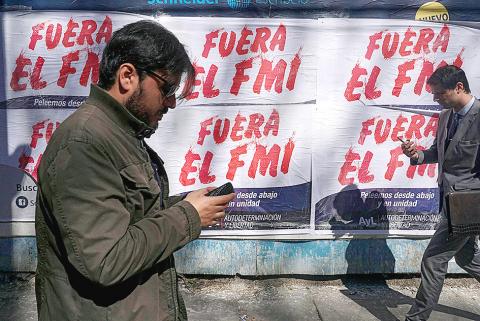Argentina “made progress” in talks on Tuesday with the IMF aimed at securing an accelerated disbursement of a US$50 billion loan it hopes will calm its debilitating economic crisis.
IMF managing director Christine Lagarde said she and Argentine Minister of Finance Nicolas Dujovne held “discussions about how the fund can best support Argentina in the face of renewed financial volatility and a challenging economic environment.”
Lagarde said talks would continue yesterday, aiming to reach “a rapid conclusion to present a proposal to the IMF executive board.”

Photo: AFP
Dujovne said it was too early to “give figures when we’re in the middle of discussions with authorities.”
Earlier, US President Donald Trump expressed “strong support” for Argentina after a telephone call with Argentine President Mauricio Macri, who has announced plans to slash the country’s bureaucracy and raise taxes on exports to calm battered financial and currency markets, and get the economy back on an even keel.
“I have confidence in President Macri’s leadership, and I strongly encourage and support his engagement with the International Monetary Fund to strengthen Argentina’s monetary and fiscal policies to tackle the country’s current economic challenges,” Trump said in a statement after speaking with Macri.
The Argentine peso has lost half its value against the US dollar this year, hampering government efforts to get inflation under control.
Argentina has already used a first US$15 billion tranche of the three-year line of credit agreed in June, mainly to prop up its currency.
Andres Abadia of Buenos Aires consultancy Pantheon said Argentina’s austerity measures “should be seen as a positive, but market confidence in Argentina remains fragile.”
“The meeting with the IMF will probably help to have a clearer picture of the country’s prospects,” Abadia added.
The Washington talks came a day after Macri announced he is slashing the number of government ministries by half and restoring a tax on booming grain exports to bring deficits under control.
The move signaled the abandonment of a gradualist approach to reducing inflation by the market-friendly president, who was elected in 2015.
“We must move a lot faster,” Marci said in a televised address. “We know that this is a bad tax, but I have to ask them to understand that it is an emergency and we need their contribution.”
At the current exchange rate, the move would put an extra US$7.1 billion in state coffers.
Twelve of Argentina’s 22 government ministries will be closed or merged under the measures, including two key portfolios, health and labor.
Santiago Ponce, a Ministry of Labor employee, said slashing the government was a bad sign.
“Halving ministries implies a really dire situation for the public administration and the state. They are reducing the state, they are shrinking it, the state is losing its power to regulate,” he said.
Argentina has already pledged to cut its budget deficit to 1.3 percent of GDP next year, but at a news conference on Monday prior to leaving for Washington, Dujovne said it would go further next year and eliminate its primary deficit — its borrowing needs before debt servicing.
“In 2019, we want to reach primary fiscal equilibrium, and by lowering the deficit, we will lower our need to issue debt,” he said.
The current deficit target for this year is 2.7 percent of GDP.

Intel Corp chief executive officer Lip-Bu Tan (陳立武) is expected to meet with Taiwanese suppliers next month in conjunction with the opening of the Computex Taipei trade show, supply chain sources said on Monday. The visit, the first for Tan to Taiwan since assuming his new post last month, would be aimed at enhancing Intel’s ties with suppliers in Taiwan as he attempts to help turn around the struggling US chipmaker, the sources said. Tan is to hold a banquet to celebrate Intel’s 40-year presence in Taiwan before Computex opens on May 20 and invite dozens of Taiwanese suppliers to exchange views

Application-specific integrated circuit designer Faraday Technology Corp (智原) yesterday said that although revenue this quarter would decline 30 percent from last quarter, it retained its full-year forecast of revenue growth of 100 percent. The company attributed the quarterly drop to a slowdown in customers’ production of chips using Faraday’s advanced packaging technology. The company is still confident about its revenue growth this year, given its strong “design-win” — or the projects it won to help customers design their chips, Faraday president Steve Wang (王國雍) told an online earnings conference. “The design-win this year is better than we expected. We believe we will win

Chizuko Kimura has become the first female sushi chef in the world to win a Michelin star, fulfilling a promise she made to her dying husband to continue his legacy. The 54-year-old Japanese chef regained the Michelin star her late husband, Shunei Kimura, won three years ago for their Sushi Shunei restaurant in Paris. For Shunei Kimura, the star was a dream come true. However, the joy was short-lived. He died from cancer just three months later in June 2022. He was 65. The following year, the restaurant in the heart of Montmartre lost its star rating. Chizuko Kimura insisted that the new star is still down

While China’s leaders use their economic and political might to fight US President Donald Trump’s trade war “to the end,” its army of social media soldiers are embarking on a more humorous campaign online. Trump’s tariff blitz has seen Washington and Beijing impose eye-watering duties on imports from the other, fanning a standoff between the economic superpowers that has sparked global recession fears and sent markets into a tailspin. Trump says his policy is a response to years of being “ripped off” by other countries and aims to bring manufacturing to the US, forcing companies to employ US workers. However, China’s online warriors